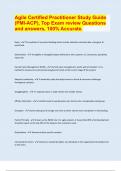Exam (elaborations)
Agile Certified Practitioner Study Guide (PMI-ACP), Top Exam review Questions and answers, 100% Accurate.
Agile Certified Practitioner Study Guide (PMI-ACP), Top Exam review Questions and answers, 100% Accurate. Deep - -The qualities of a product backlog which include: detailed, estimate-able, emergent, & prioritized. Deliverables - -A tangible or intangible object delivered to the customer. Ex...
[Show more]



